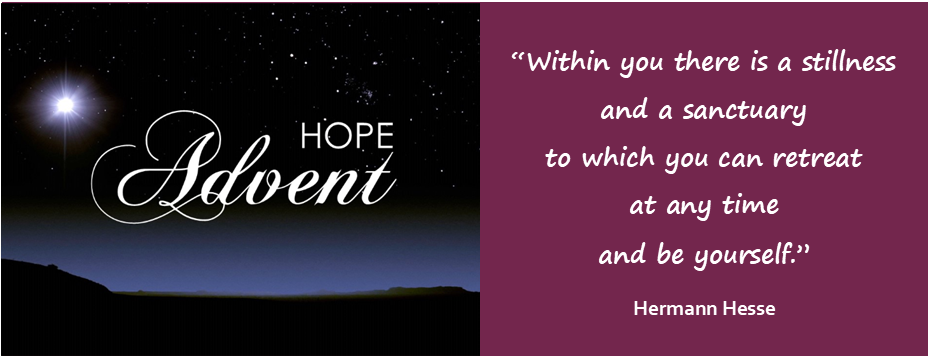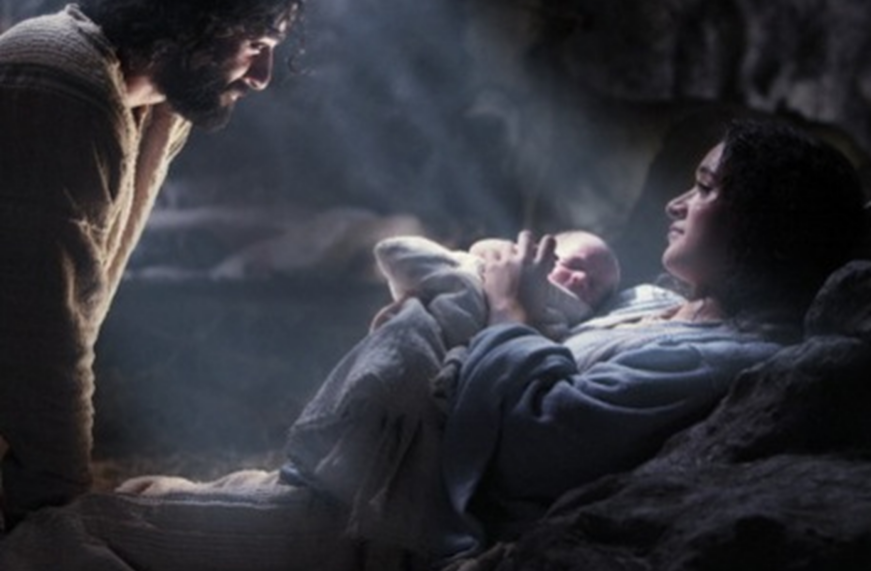God is Our Hope

As we enter the blessed season of Advent, this quote seems appropriate. I always think of Advent as a quiet season. It is a time of reflection and stillness. In a season that can be crazy, we need to go to our inner sanctuary and be still. Of course, we can go there anytime or any season. What do we do during our stillness? We listen to our loving God to hear His voice. The first week of Advent focuses on the virtue of HOPE. One of the things everyone hopes for is peace throughout the world and here in our own country. It is heartbreaking to see all the mass shootings, the impoverished people, especially the homeless suffering from cold and hunger, as well as those who are disabled, sick, lonely, or elderly with unmet needs. These are just some issues in our own country as well as in the world. Sometimes life may seem hopeless, but it is not. God is our hope.
God sent His Son to be with us no matter how rough life may be. He is our light when all seems dark. This is when we need to go to our sanctuary to converse with God. We need to let go of things that interfere with our stillness. If it is not good for your soul, then let it go! God sent Jesus to be our light and we are to spread this light to others. When you see the Christmas lights, reflect on the strands of light. If one of them burns out, the whole strand is affected. If they are all lit, they shine and light everything around them. Think about how you are a light to whomever needs it in their life. Remember to spend time in stillness and your sanctuary so your light shines even more brightly. Let us light up the world and send HOPE to others so that our strands do not burn out!


 Advent because it’s my favorite liturgical season (not just because of the purple), but I wasn’t getting inspired. So, I decided to look at the readings for Wednesday when this would be sent out. Not until I clicked on the USCCB daily readings did I recall that yes, it’s the Feast of the Immaculate Conception. Thanks, Holy Spirit! I have more devotion for this feast after I wrote a paper on Franciscan Friar John Duns Scotus and discovered it was his explanation of how Mary, a human like the rest of us who needed redemption, could be conceived without sin that led to the Immaculate Conception becoming a dogma. I had not known about the vigorous theological debate regarding the concept that had spanned centuries. I’d seen enough Miraculous Medals in my life that I’d not given it a thought. However, in the Roman Rite, Pope Pius IX declared it a dogma in 1854. 1854! In the history of the Church, that is like yesterday. Scotus mapped out his subtle yet brilliant explanation before his death in 1308. It took centuries before the Church officially recognized his work on this idea.
Advent because it’s my favorite liturgical season (not just because of the purple), but I wasn’t getting inspired. So, I decided to look at the readings for Wednesday when this would be sent out. Not until I clicked on the USCCB daily readings did I recall that yes, it’s the Feast of the Immaculate Conception. Thanks, Holy Spirit! I have more devotion for this feast after I wrote a paper on Franciscan Friar John Duns Scotus and discovered it was his explanation of how Mary, a human like the rest of us who needed redemption, could be conceived without sin that led to the Immaculate Conception becoming a dogma. I had not known about the vigorous theological debate regarding the concept that had spanned centuries. I’d seen enough Miraculous Medals in my life that I’d not given it a thought. However, in the Roman Rite, Pope Pius IX declared it a dogma in 1854. 1854! In the history of the Church, that is like yesterday. Scotus mapped out his subtle yet brilliant explanation before his death in 1308. It took centuries before the Church officially recognized his work on this idea.